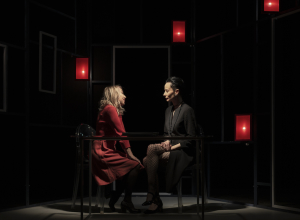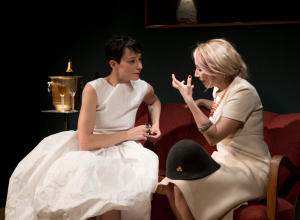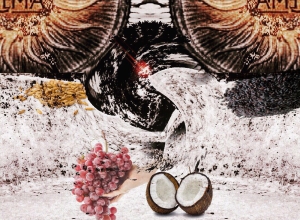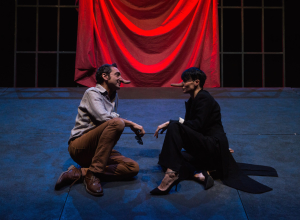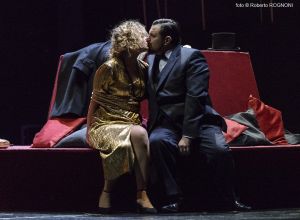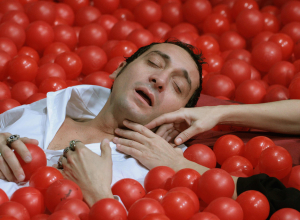#DEFINE GEBREK
“Anarchico a me!? Ah, ah! Sono un demonio io, una belva umana, altro che anarchico. Sono dotato di una tale dose di cattiveria da affossare tutte le guerre del mondo.”
Così recitava, ironico e crudele, l’Anarchico dell’immenso Gaber offrendo l’ispirazione a un giovanissimo Claudio Elli per una diversa lettura del reale. Risale al 1983 la prima stesura di questa pièce teatrale che viene sagomata intorno al significato etimologico che il termine olandese “gebrek” racchiude in sé: il concetto di povertà in quanto miseria, miseria dell’anima, identificativo di un personaggio problematico, un frustrato, un difetto della società si potrebbe dire. Chi maneggia consapevolmente queste storpiature della coscienza umana per farne arte contemporanea è Claudio Elli: scrittore di poesia e prosa, autore di testi teatrali, attore non estraneo alle incursioni nel terreno fertile della performance, giornalista pubblicista, fondatore della testata on line Punto e Linea Magazine (www.puntoelineamagazine.it), settimanale di cultura e spettacolo. Quando, in età adulta, Claudio fa una rilettura di quegli scritti giovanili, la sua penna sintetizza nel dittatore Gebrek tutti i tratti di una società alla deriva, di un mondo che pare aver perso i propri valori. E urlando urla un disagio profondo che a tutti noi intimamente appartiene.
“Gebrek è un dittatore fantomatico di un futuro che lui chiama Nuovo Mondo rispetto al quale la contemporaneità assume i connotati di Vecchio Mondo. E’ un personaggio crudele, un sadico, un pervertito. La sua cattiveria non fa altro che tradurre i difetti di questo nostro tempo presente. Qual è la miseria che lui va a identificare? E’ una miseria sua personale, sua di uomo, o una miseria della società? E’ la società alla deriva o lui un frustrato? E ammesso che sia un frustrato, lo è perché si è generato da solo o è lui stesso, con tutti i suoi difetti, frutto di questa società?“
Originariamente concepito come un monologo con una sola interruzione data da un intermezzo di poesie di esaltazione di un Dio guerriero, viene, nel 2006, contaminato dall’idea di un comics in grado di partecipare in maniera attiva sul palcoscenico. Sulla scorta di questa intuizione prende forma la Graphic Novel di Alex Miozzi, giornalista e fumettista direttore responsabile di Punto e Linea Magazine, che vede la pubblicazione in concomitanza con lo spettacolo e in scena fa interagire il comics con il testo riadattato per il teatro. Diventa un monologo fatto di due soggetti, di cui il principale Riccardo Magherini, interprete di Gebrek, è anche il Deus ex machina della regia dello spettacolo. Una vivace contaminazione fra generi prende vita sul palco e disegna una cornice di follia dal perimetro mobile. I contorni mutevoli sono quelli del comics le cui immagini grafiche saltano fuori dalle pagine di carta per diventare interpreti viventi della sceneggiatura. Confini variabili si diceva, complici i video di Francesca Lolli a fare da tappeto drammaturgico visivo, le luci del light designer Marco Meola, e due interruzioni, di cui l’ultima a sorpresa utile a svelare la presenza del secondo enigmatico personaggio. Questa azione-reazione tra generi aspira ad essere il primo elemento di un progetto di ricerca più articolato di nome Caleidos, in cui il dialogo tra le arti tende all’estremo, fino ad una drammaturgia espressa con strumenti diversi rispetto alla sola parola. Come Caleidos (personaggio di un romanzo in fieri di Claudio che pare sovraintendere a tutto quello che accade sulla terra come osservatore esterno che ha un punto di osservazione alchemico su tutto ciò che avviene) volesse giungere ad una sublimazione del teatro, inventandosi un palco in grado di trascendere i suoi stessi confini fisici per diventare qualcosa da vivere in più luoghi contemporaneamente. Pur in una azione scenica contraddistinta da ironia e comicità sagace, quello di Gebrek rimane un messaggio forte, duro, brutale perfino, che vuole essere un monito più che una dirittura morale. Una riflessione aperta sul destino dell’umanità, un invito affinchè sia più autenticamente sé stessa, perché ritorni consapevole del proprio ruolo dimenticato, al riparo dalla dilagante falsità e ipocrisia di maniera dei giorni nostri.
Gebrek è in fondo l’urlo che accompagna una società alla deriva, affetta da una crisi tanto economica quanto sistemica. Una crisi di identità culturale anche. Che tutto stringe nella sua morsa e annienta, pure il teatro. Da cui forse solo un’Europa che sappia ripristinare la logica della polis di antica memoria potrà salvarci.
Gebrek Monologo interrotto in due parti – al Teatro Litta (www.teatrolitta.it) dal 11 al 20 dicembre 2014. Di Claudio Elli – interpretazione e regia Riccardo Magherini e Claudio Elli – comics Alex Miozzi – disegno luci Marco Meola – video Francesca Lolli – voce femminile fuori campo Federica Armillis.
Desidero ringraziare per la gentile intervista Claudio Elli, qui nella sua veste di autore teatrale. www.gebrek.it
Disegni tratti dalla graphic novel “Gebrek” by Alex Miozzi – Ed. Nuvole&Strisce
Elaborazione grafica logo spettacolo by Stevio Studio
Video di Pasquale Russo
Traduzione di Chris Alborghetti
THE DUMMY MEETS CLAUDIO ELLI #DEFINE GEBREK
“Me? Anarchic? Ah, ah! I’m a devil, a beast, anarchic my foot! I am so evil that I could sink all wars in the world.”
This is how the ironic and cruel Anarchic by the immense Gaber, recited. The Anarchic inspired the young Claudio Elli who through that character found the key to a different interpretation of reality. The first draft of the theatrical pièce which was built around the etymological significance of the Dutch word “gebrek”, dates back to 1983. In this respect, “gebrek” connotes poverty and destitution, especially that of the soul which is indicative of a problematic and frustrated character who represents in a way a society’s flaw. Claudio Elli is the one who utilises human conscience defects and weaknesses in order to create contemporary art. Claudio Elli writes poems, prose and theatre scripts too. He is an actor who is fond of performing on stage, a freelance journalist and founder of the online newspaper Punto e Linea Magazine (Point and Line Magazine) www.puntoelineamagazine.it which is a culture and entertainment weekly. At one point, during adulthood, Claudio decides to go through his early writings. Then, with his pen he summarises in words the key points that depict the dictator Gebrek and consequently also the features of a society that is adrift and a world that seems to have lost its values. Claudio in this way cries out for a change and expresses the severe discomfort and uneasiness that we feel these days.
“Gebrek is an imaginary dictator in a future that he names the New World in which the contemporary society has the characteristics of the Old World. He’s a cruel and evil character, he’s sadistic, perverted and depraved. His evilness displays nothing more than the flaws of the turbulent present times. Nevertheless, what sort of poverty does he deal with? Is it something strictly personal, I mean related to his soul and real self as a man, or rather to society? Moreover, is society that is adrift or rather him who is frustrated? And even assuming that he is frustrated, is he like that because of himself, I mean the way he really is or rather because of his faults that have to be attributed to society?”
Initially it was supposed to be a monologue and one interlude with poems extolling a warrior God. Nonetheless, in 2006 the performance embraces comics which start playing a major part on stage. It is on this acute intuition that the Graphic Novel by Alex Miozzi a journalist, comic book illustrator and editor of Punto e Linea Magazine (Point and Line Magazine), takes shape. Alex Miozzi in fact, wishes for the publication to occur in concomitance with the performance, thus he makes the comics play the characters on stage rearranging the script in such a way that is suitable for a theatre performance. As a result, the show turns into a monologue recited by two actors one of whom, the main one, Riccardo Magherini, plays Gebrek and is also the co-director of the show. On stage, takes place a lively intermingling of genres which creates a setting for madness within a mobile perimeter. The variable contours are those of the comics of which graphic images pop up from pages of paper and become living characters who act according to the scenario. The variable borders we talked about earlier, are the result of the videos by Francesca Lolli which are the dramaturgic visual aspect of the show, the lights arranged by the lighting designer Marco Meola and the two interludes of which the last one takes the audience by surprise and unveals the second enigmatic character. This action-reaction among genres is the first element of a more well-structured research project named Caleidos in which the dialogue among the arts is carried to extremes in such a way that dramaturgy is expressed in many different ways and not merely through words and actions. Like Caleidos (a character of a novel in the making by Claudio Elli who seems to oversee everything that happens on earth as an alchemic observer) Claudio Elli does the same as though he wanted to elevate and sublimate the theatre. To do so, he invents a stage which somehow transcends its physical barriers so as to become something to be experienced in more places simultaneously. Although Gebrek plays in a setting marked by irony and sagacious comedy, puts across a message which is unambiguous, strong, powerful and even brutal if I can say so and that is meant to be an admonition more than a way to instil moral rectitude. The show is a sort of reflection on the destiny of humanity which he exhorts to be authentic, hence to be itself in order to be aware of the role it plays since, apparently, it has forgotten it in these times of rampant hypocrisy and falsity.
“Gebrek in the end of the day can be seen as a cry of despair, sorrow and grief over a society that is adrift because of an economic and systematic crisis which is also a crisis of cultural identity. Everything is in the thick of it also the theatre which gets tightened as though it was in a vise and risks of being wiped off the face of the earth. If Europe is able to fully restore itself to health, it might also be able to rescue and save all of us from annihilation.”
Gabrek Monologue separated by two interludes, at Litta Theatre (www.teatrolitta.it) from 11 to 20 December 2014. Written and produced by Claudio Elli, directed by Riccardo Magherini and Claudio Elli, comics by Alex Miozzi, lighting design and stage lighting by Marco Meola, video by Francesca Lolli and voice-over by Federica Armillis.
I would like to offer my special thanks to Claudio Elli, here in his capacity as playwright, who gave the interview to me. www.gebrek.it
Drawings based on the graphic novel by Alex Miozzi – Ed. Nuvole&Strisce
Show logo graphic by Stevio Studio
Video by Pasquale Russo
Translation by Chris Alborghetti


